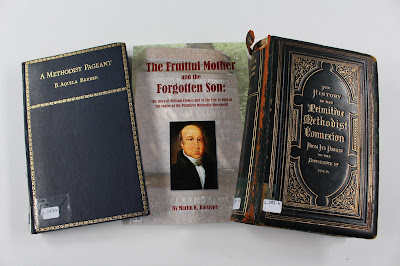 |
| A selection of our Local Studies books on the history of Primitive Methodism [L.287.4] |
William Clowes was a distant relation of Josiah Wedgewood and was apprenticed to him in Burslem at the age of 10. His family was much poorer than his famous relation’s and he had not received much education. As a young man he was known for his reckless behaviour and admitted in later life that he spent his youth ‘banqueting, gambling and fighting’. He had originally come to Hull to work as a potter in 1804 and received a good wage which he spent on drinking and gambling. Eventually he and some friends got into trouble for impersonating the press gang and he left the city hurriedly, without paying his debts. He returned to Burslem and eventually dedicated his life to God. He worked hard, transformed his life and payed all his debts including those he had incurred in Hull.
In 1819 he was invited back to Hull as a Primitive Methodist preacher. The Primitives believed that the Wesleyan Methodist Church had become too complacent and they were not reaching the people who needed them most. So outdoor meetings, known as camp meetings, were organised and thousands of people attended them. Preachers spoke from the back of carts to those gathered round and because of the way they spoke they became known as Ranters. The Hull Advertiser of 9 July 1824 reports a camp meeting in Cottingham attended by two to three thousand people. The Wesleyan Methodist Church expelled anyone known to attend these camp meetings so the Primitives had set up their own church. It was already in existence when Clowes came to Hull but with a drive for revival and charismatic speakers led by William Clowes it quickly expanded. The church was divided into circuits and the Hull Circuit became a mission centre for the whole country.
 |
| Hull Primitive Methodist Church Centenary brochure [L.287.4] |
The history centre holds a variety of records from the whole of the Methodist church some of which are administrative records, which can sometimes bring interesting stories with them. Cottingham Primitive Methodist Church had an ongoing saga with their caretaker, she would ask for a pay rise, they would refuse, she would hand her notice in and eventually a compromise would be reached [C DCT/384].
Family historians can view the registers which are kept here, baptisms and marriages are useful sources of information, some are on microfilm and are available to view in the library area, others are the original registers and available in the Search Room. The Primitive churches kept lists of all their members and these are known as roll books which are also available to view in our search room. We do not have registers or roll books for all churches but a list of records held is available, again in the search room, and also on our catalogue.
 |
| Stoneferry Primitive Methodist Church baptism register [C DCE/430] |
An important Methodist gathering is the annual conference which is still held today. The first Primitive Conference was held in May 1820 in the chapel at Hull where it was reported that there were 7,842 members of the church countrywide. These gatherings debated how the church was to be run. There were strict rules and regulations for congregations and especially for the preachers who were the mainstay of the church. A resolution was passed stating that men were to wear plain dress; single breasted coats only and no fashionable trousers or white hats. The Primitives, unlike the Wesleyans encouraged women preachers and Jane Brown was one woman already preaching in Hull when Clowes arrived.
 |
| Centenary Conference programme, 1920 [L.287.4] |
Clowes died in Hull on 2 March 1851. He was buried in ‘Primitive Corner’ in the Hull General Cemetery. His funeral cortege passed through Hull where many lined the streets to pay their repects.
The Hull History Centre holds many records relating to the Primitive Methodist Church in Hull. More information about William Clowes and the history of the church can be found in our Local Studies collection [reference number L.287.4].
Elaine Moll, Archivist/Librarian (Hull City Archives and Local Studies Library)

My father was a Methodist, lived and was born in Hull. It follows that his parents were also Methodists. How many communities were there in Hull?
ReplyDeleteBy the look of it there were quite a few Methodist communities in Hull. They were certainly a number of Methodist churches across the city!
DeletePerhaps this link from our website on religious records might help http://tinyurl.com/5hcjny3z